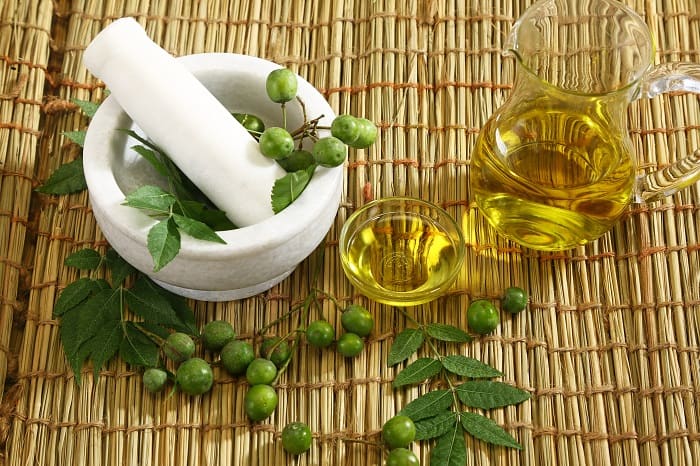Every gardener faces the dilemma of pests lurking in their garden. While some of these insects are beneficial insects in the garden, others cause a headache for gardeners. Using the natural approach in getting rid of pests is not only economical but it is more effective and much safer, especially for the end-users, the consumers. One of the most common ways to eradicate pests naturally is by using neem oil
There are different ways how to control pests in your garden. Some would choose the easiest way by using chemical pesticides to eradicate them, but most farmers would prefer the more natural way.
As a small-time gardener, I am inclined to know more about how to use neem oil on plants, and applying neem oil as an insecticide to the
What is Neem Oil?
Neem oil is produced from neem seeds from the Azadirachta Indica tree, which is usually cultivated in Southeast Asia. Neem trees contain Azadirachtin, a compound that works as a growth inhibitor and appetite suppressor. Once consumed by pests, it causes them to starve and eventually die. In addition, the compound also inhibits the hormonal system of insects, preventing them from reproducing.

What are the Uses of Neem Oil?
Neem oil gives a lot of beneficial effects including skin and hair care, joint stiffness, pain, wound healing, and so on. However, we’ll just focus on its valuable effects on plants. These are:
An Organic Way of Eradicating Pests
This is the most common and effective way gardeners and farmers use to eradicate unwanted pests in their gardens and farms. It can either be used as a spray, neem cake, or
It Works as a Fertilizer
Neem cake, which is composed of the de-oiled residue from neem kernels, acts as a
It Works as a Bactericide
It prevents fire blight, a bacterial disease that makes plants appear wilt like they have been burned. To use neem oil in this case, spray it on trees when it is still in its dormant stage.
It is a Fungicide
Neem oil is also effective in killing fungi in plants. Spray the plants once a week with neem oil to kill the fungi then spray it every two weeks to stop them from coming back.
It Protects Your Crops
Aside from pesticide and insecticide effects, neem oil will also protect your garden from pests’ infestation. It keeps these unwanted foes from lurking again in your garden. Furthermore, insects will not be resistant to neem oil, meaning you can use it again and again either as a pesticide or as protection. It helps to control aphids, leafhoppers, mealybugs, mites, thrips, various kinds of beetles, horn flies, whiteflies, and many more.
It Keeps Mosquitoes Away
The neem oil extract can be applied to your skin to keep mosquitoes away but to be sure, try to apply a small amount of oil in your body first to see if you are sensitive to it.
Learn How To Mix Neem Oil For Plants And Its Application Process
Why Should you Use the Neem Oil Soil Drench Recipe?
Neem oil as a
Systematic Insecticide
As aforementioned, when you use neem oil insecticide on your
Protects from Fungi and Bacteria
Also, neem oil will protect the plant against fungal and bacterial contamination because of the compound Azadirachtin.
Treat Root Rots
Neem oil that is drenched in the
Eradicates Harmful Organisms while Keeping the Beneficial Ones
Aside from that, it eradicates nematodes and other harmful
It Doesn’t give a Detrimental Effect on Consumers, Wildlife, Pets, etc.
There is a small possibility that it will negatively impact humans, pets, and other wildlife by using neem oil as a spray. However, using neem oil as a
How to Prepare and Use the Neem Oil Soil Drench Recipe?
To make the Neem oil
- 1 quart of warm water
- A teaspoon of cold-pressed Neem oil
- Liquid dish soap
- Container for your neem oil spray
Mix the ingredients well. We all know that water and oil will not go together, so the liquid dish soap will emulsify the two to stabilize the mixture. Choose a dish soap that is not harsh on plants. It is important to note that you have to prepare the solution in a warm place or use warm water because neem oil will solidify in cooler temperatures. Also, do take note that warm water should be used and not hot, boiling water as it may destroy Azadirachtin.
Neem Bliss (32 Fl Oz) – Pure Neem Oil Concentrate – 100% Cold Pressed Neem Oil – All-Natural Neem Oil Concentrate – Pure Neem Oil Extract – Unrefined Neem Oil for Hair – Neem Seed Oil Concentrate
More Products for Your Garden with Neem Oil
- Monterey – Insecticide for organic gardening with 70% Neem Oil
Natria- Organic Plant Protection From Pests and Diseases, with 70% Neem Oil
Can You Mix Neem Oil With Copper Fungicide?
It is not recommended to mix neem oil with copper fungicide. These products are very different and how they’re used differs too.
Neem oil is a natural pesticide derived from neem tree seeds. You can use it to control various pests and diseases, including aphids, Japanese beetles, leafhoppers, mealybugs, nematodes, spider mites, thrips, and whiteflies. It’s also effective at killing fungal diseases like anthracnose, black spot, leaf spot, powdery mildew, and scab.
Copper fungicide is a synthetic product. You can control fungal diseases like anthracnose, black spot, downy mildew, fire blight, powdery mildew, and rust.
Mixing neem oil and copper fungicide can reduce the effectiveness of both. It could also create harmful byproducts. Neem oil is best used to treat existing issues, while copper fungicide is best for prevention. I suggest using each separately. Remember to follow the label instructions to ensure satisfactory results.
Can Neem Oil Be Mixed With Fungicide?
You can mix neem oil and selected fungicides after establishing their compatibility. However, the practice is widely recommended.
If you want to try mixing neem oil with a fungicide, choose a dormant or delayed dormant spray. Test for compatibility by mixing a small amount at first. If the two products combine well without clumping, you can give them a go.
A better option, however, might be investing in a tripel-action product. Choose one that’s an insecticide, fungicide, and miticide in one.
Which Indoor Plants Don’t Like Neem Oil?
Not all plants like neem oil. Some may be sensitive and damaged if you treat them with neem oil or products containing them. It’s essential to research each plant carefully before using this insecticide/fungicide on it.
You should avoid spraying neem oil on indoor plants with delicate or wispy leaves. This includes the iron-cross begonia, peacock plant, prayer plant, nerve plant, ti plant, china doll, inch plant, fatsia, people, palms, purple passion, aralia, and ferns. These plants may be damaged if treated with neem oil, and it is best to avoid using the product on them or to consult a professional before doing so.
If growing herbs indoors, you should also avoid using neem oil on many of them. Herbs that don’t react favorably when neem oil is used on them include:
- Basil
- Thyme
- Oregano
- Dill
- Caraway
- Marjoram
- Cilantro
- Parsley
Conclusion
Using a neem oil
Now that we are made aware of its beneficial effects and how easy it is to prepare and incorporate it into our
FAQ’s Neem Oil Soil Drench
What bugs does neem oil kill?
The organic neem oil pesticide kills or eliminates more than 200 species of bugs or insects. A couple of them are aphids, whiteflies, thrips, cabbage worms, gnats, roaches, termites, mites, scale, caterpillars, mealybugs, lice, leafhoppers, psyllids, etc.
However, note that neem oil insecticide will not kill bugs all bugs when sprayed alone. It will mostly kill bugs that eat the leaves of the plants you spray them with.
The special powerful organic ingredient azadirachtin can also repel and suffocate any harmful insect that feeds on your leaves. Therefore, beneficial insects like ladybugs are not harmed because they do not feed on leaves.
Neem oil will also halt any stage of the harmful insect. Be it eggs, larvae, or pupae thereby putting an end to the continuity of any harmful insects. They are as well effective in controlling nematodes and fungi disease issues.
What plants should you not use neem oil on?
Even though neem oil is usually used for a couple of crops such as fruits, herbs, ornamental plants, and vegetables: they are however not suitable for some plants. Neem oil should not be used on seedlings, or plants that have been recently transplanted.
Ideally, you should not use neem oil on plants that can be stressed. Spraying neem oil on some plant foliage may be harmful, they may burn their leaves.
Do I need to rinse off neem oil?
You do not necessarily need to rinse off neem oil. Neem oil when sprayed on plants will dry and when they dry they won’t smell bad if you are worried about the smell.
Even though neem oil is a purely organic insecticide, ensure you wash thoroughly water vegetables, and fruits sprayed with neem oil.
Always use neem oil when the sun is down to avoid leave burns. Also, use the right concentration mixture. If you probably made the mistake of spraying during a sunny day or used too much concentration, you can rinse it off so it won’t burn your leaves.
What if I use too much neem oil?
Some plants may take heavy neem oil applications fine; however, using too much neem oil on other plants may be bad for them. Ideally, you should test a small part of your plant and monitor it for about 24 hours.
This way, you have an idea of how much to use in your garden to avoid too much application and leave burns.
Usually, the right amount used should be 2 to 4 teaspoons mixed with one gallon of water. However, you should check the label and follow instructions to know the right concentration usage.
How long does neem oil take to work?
Neem oil may take some time to work effectively. It may even require a couple of reapplications to totally eliminate and control the harmful insect population.
Neem oil can last up from 3 to 22 days in the






